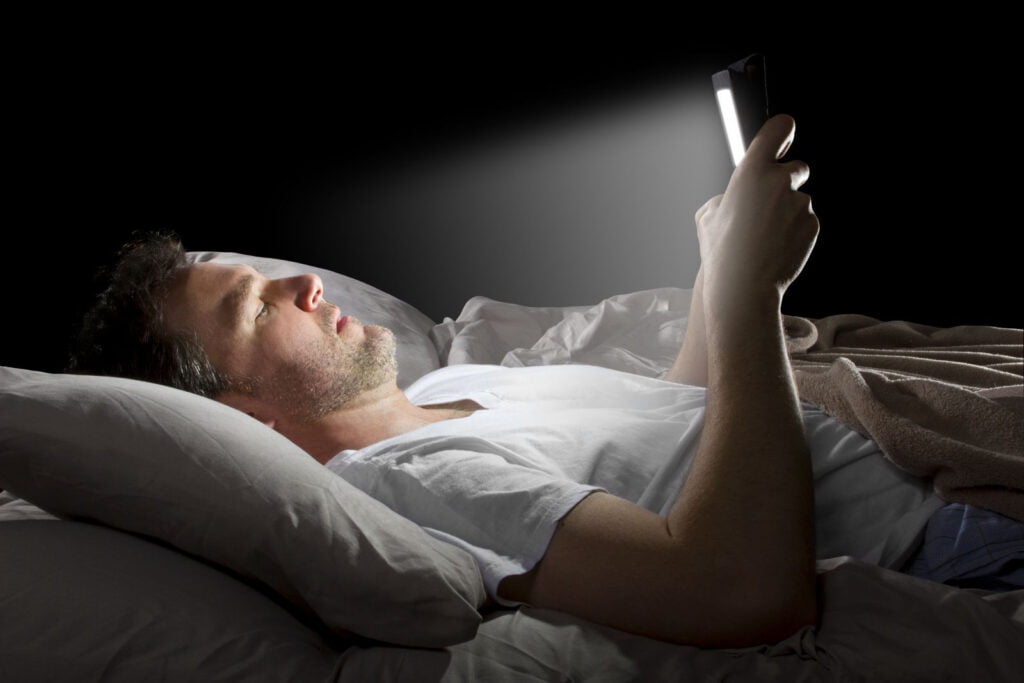In our hyper-connected world, the lure of our mobile phones can be irresistible, even when we should be sleeping.
However, using your mobile phone before bed can have serious consequences for your health, particularly your sleep quality. Here’s a closer look at why it’s essential to put down your phone before bedtime.
The Impact of Blue Light on Sleep

One of the primary reasons mobile phones affect sleep is the blue light they emit. Blue light interferes with the production of melatonin, the hormone responsible for regulating sleep-wake cycles. Reduced melatonin levels make it harder to fall asleep and stay asleep, leading to insufficient rest.
Sleep Disruptions and Insomnia

Regular use of mobile phones before bed can cause sleep disruptions and even chronic insomnia. The mental stimulation from engaging content or stressful notifications can keep your brain active, preventing it from winding down. This increased alertness can make it challenging to fall asleep, resulting in fragmented sleep patterns and reduced overall sleep quality.
Physical Health Consequences
Lack of sleep due to late-night phone use can have numerous adverse effects on your physical health. Chronic sleep deprivation is linked to a range of health issues, including:
- Weakened immune system: Less sleep weakens your immune response, making you more susceptible to illnesses.
- Weight gain: Sleep deprivation can disrupt hormones that regulate appetite, leading to increased hunger and potential weight gain.
- Heart disease: Poor sleep is associated with higher risks of heart conditions, including hypertension and heart attacks.
Mental Health Impacts
The mental health consequences of inadequate sleep are just as significant. Poor sleep can lead to:
- Increased stress and anxiety: Lack of sleep can heighten stress levels and exacerbate anxiety, creating a vicious cycle of sleeplessness and mental health struggles.
- Cognitive impairments: Insufficient sleep impairs cognitive functions such as memory, concentration, and decision-making.
- Mood disorders: Chronic sleep deprivation is linked to depression and other mood disorders.
Tips for Better Sleep Hygiene

To improve your sleep quality and overall health, consider implementing these tips for better sleep hygiene:
- Set a bedtime routine: Establish a consistent bedtime routine to signal your body that it’s time to wind down. This can include activities such as reading, taking a warm bath, or practicing relaxation techniques.
- Limit screen time: Avoid using your mobile phone, computer, or TV at least an hour before bed. If you must use your phone, consider enabling a blue light filter or using apps designed to reduce blue light exposure.
- Create a sleep-friendly environment: Make your bedroom a sanctuary for sleep by keeping it cool, dark, and quiet. Invest in a comfortable mattress and pillows.
- Prioritize relaxation: Engage in calming activities before bed, such as deep breathing exercises, meditation, or gentle yoga, to help relax your mind and body.
- Set boundaries: Make a habit of turning off notifications and setting your phone to “Do Not Disturb” mode to avoid interruptions during the night.
By understanding the impact of mobile phone use on sleep and taking proactive steps to reduce screen time before bed, you can improve your sleep quality, enhance your overall health, and wake up feeling more refreshed and rejuvenated. Prioritize your sleep health by disconnecting from your devices and allowing your body the rest it needs to function optimally.

